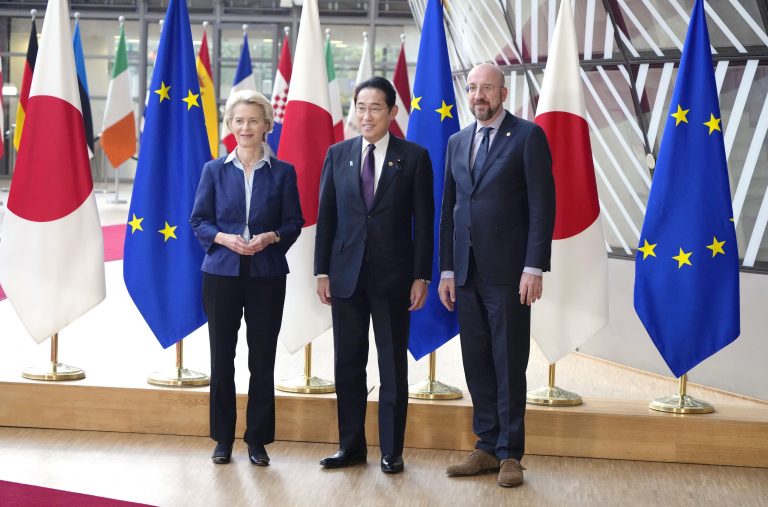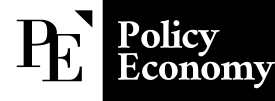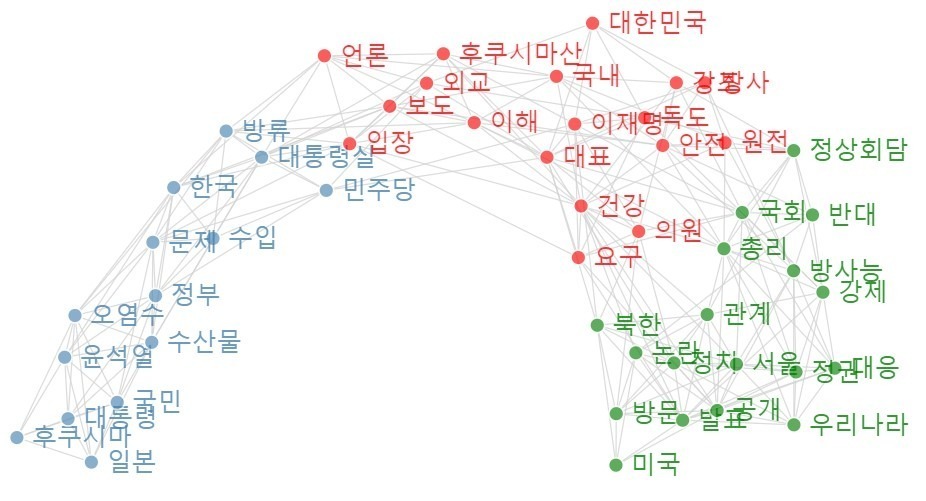[동아시아포럼] 일본-EU 디지털 동맹과 성공을 위한 과제
반도체·디지털경제·해저케이블 등 4대 핵심과제 추진 반도체 관련해 장비·화학솔루션 분야 기술 개발 협력 전자상거래 등 디지털 경제 관련 공통 규제 마련 추진
[동아시아포럼]은 EAST ASIA FORUM에서 전하는 동아시아 정책 동향을 담았습니다. EAST ASIA FORUM은 오스트레일리아 국립대학교(Australia National University) 크로퍼드 공공정책대학(Crawford School of Public Policy) 산하의 공공정책과 관련된 정치, 경제, 비즈니스, 법률, 안보, 국제관계에 대한 연구·분석 플랫폼입니다. 저희 폴리시코리아(The Policy Korea)와 영어 원문 공개 조건으로 콘텐츠 제휴가 진행 중입니다.
지난 7월 3일 일본과 유럽연합(EU)은 지난해 합의한 ‘디지털 파트너십’의 일환으로 제1차 장관급 협의회를 개최한 바 있다. 당시 양국은 반도체 분야의 협력각서(MoC)를 체결하고 공동 관심사에 대한 협력을 강화하기로 합의했다.

일본·EU, 반도체와 디지털 경제 분야 협력 강화
일본과 EU 간 디지털 파트너십은 반도체, 디지털 경제, 해저 케이블, 초고성능 컴퓨팅 등 4대 분야에 초점을 맞추고 있다. 이 중에서도 반도체와 디지털 경제는 핵심 과제로 꼽힌다. 먼저 반도체 산업과 관련해 양국은 지난 제1차 협의회에서 체결한 협력각서를 통해 첨단기술 개발과 연구개발(R&D) 확대, 공급망에 대한 조기 경보 메커니즘 구축, 선도기업 유치, 보조금의 투명한 집행 등에 대한 공동 조치를 추진하기로 합의했다.
반도체 산업에서 일본과 EU가 선도국으로서 우월적 지위를 확보할 가능성은 현실적으로 높지 않지만 반도체와 관련한 특정 분야에서 첨단기술을 확보할 잠재력은 가지고 있다. 실제 EU는 반도체 장비와 제품 디자인 분야에서, 일본은 반도체 웨이퍼 공정용 화학 솔루션과 광학장비 등에 경쟁력을 갖추고 있으며 이외에도 반도체 관련 분야의 신기술 확보를 위해 투자를 강화하고 있다.
반도체 분야에서는 핵심기술의 발전과 주요 기업들의 순위 변화가 매우 빠르게 일어나기 때문에 앞으로 몇 년간의 상황을 예측하는 것은 사실상 불가능하다. 이런 가운데 산업 경쟁력을 강화하는 가장 좋은 방법은 관련된 기술을 한 곳에 집적시키는 전략으로, 이미 미국 등 주요국들은 글로벌 반도체 기업의 생산시설을 자국에 유치하기 위해 보조금 경쟁을 벌이고 있다. 일본과 EU도 반도체 기술 경쟁에 뒤처지지 않기 위해 정부 보조금을 지원하고는 있지만 현실적으로 미국과의 경쟁에서 우위를 점할 가능성이 높지 않은 데다 기존의 무역 규제와도 배치될 우려가 있어 신중하게 접근하고 있다.
보조금 기반 반도체 파트너십, 장기적으론 한계
현재 각국은 반도체 기업들을 한데 모으기 위해 유인책으로 보조금을 지원하거나 정부 간 협의를 이끌어 내고 있지만, 사실 이러한 노력이 실제 반도체 산업에 미칠 수 있는 영향은 제한적이다. 핵심 기술과 생산 노하우는 정부가 아닌 민간기업이 보유하고 있는데, 기업들은 자사가 확보한 독점적 기술과 경영상 기밀을 유지하기 위해 정보 공유에 응하지 않을 가능성이 높기 때문이다. 각국 정부가 보조금을 통해 민간기업에 어느 정도의 통제와 영향력을 행사할 수는 있겠지만 보조금 효과가 중장기적으로 이어지기는 어렵다.
앞서 1980~1990년대 일본은 정부 주도하에 민간기업 간의 협력체계 구축을 시도했지만 실패한 바 있다. 최근 일본 외무성 등 무역 당국이 EU와의 디지털 파트너십을 촉진하기 위해 주요 글로벌 기업에 대한 접촉을 시도하고 있는 만큼, 협의를 시작하기 전에 이러한 시도가 이미 한 차례 실패했음을 상기할 필요가 있다.
더욱이 이번 디지털 파트너십은 단순히 민간기업뿐만 아니라 EU 등 다른 나라의 정부와도 조정이 필요하다는 점에서 더욱 제한적이다. 특히 초국가적인 의사결정 구조를 가진 EU의 경우, 회원국들의 공감대를 이끌어내고 합의를 도출해야 하는 작업이 선행돼야 한다. 여러 나라의 정부와 민간기업들이 참여하는 조정과 합의 작업은 이상적인 아이디어지만, 사실상 효과를 보장하기는 어려운 셈이다.
데이터의 자유 이동에 대한 합의 도출 선행돼야
두 번째 핵심과제인 디지털 경제는 데이터의 자유 이동과 관련한 원칙을 정하는 데 초점을 두고 있다. 지난해 일본과 EU는 양자 간 공동성명을 통해 전자상거래 등 디지털 경제와 관련한 다각적인 협력에 합의했다. 당시 공동성명에서 EU는 기존에 강조해 온 엄격한 정보보호의 원칙에서 벗어나 신뢰기반 데이터 이동(DFFT)의 개념을 수용하고, 국경을 넘어 자유로운 데이터의 이동을 보장하기로 했다. 그동안 개인의 정보 보호를 최우선시했던 EU는 데이터의 자유로운 이동이 아닌 데이터 국지화 정책을 고수해 왔다. 일례로 지난 2019년 EU는 일본과의 경제연계협정(EPA)을 체결하기 위한 양자 간 협상에서 포괄적·점진적 환태평양 경제동반자협정(CPTPP)의 핵심 사항인 데이터의 자유로운 이동과 데이터 국지화 해제 원칙을 수용하지 않았다.
하지만 최근 정보 이동과 관련한 EU의 입장 변화는 추후 일본과의 파트너십을 강화하는 데도 긍정적인 영향을 미칠 것으로 보인다. 일본을 비롯한 호주 등 아시아태평양 국가들은 디지털 경제와 관련해 데이터의 자유로운 이동을 원칙으로 하고, 이에 따른 사회적 논란과 경제적 현안을 해소하기 위해 다양한 정책을 도입하고 있다. 이러한 노력은 지난 2019년 진행된 G20 정상회의에서도 있었다. 당시 주최국이었던 일본은 공동의제 개발을 위해 열린 T20(Think 20) 회의와 이어 개최된 G20 정상회의에서 사생활을 침해하지 않는 데이터의 자유로운 이동과 전자상거래 규범을 논의하는 이른바 ‘오사카 트랙’의 구축을 제안했다.
일본과 EU 간 디지털 파트너십에서 반도체 분야의 성공 가능성은 불확실한 데 반해 디지털 경제의 원칙과 규제를 조정하는 작업은 매우 효과적이고 중요한 과제다. 특히 디지털 경제에서 양자 간 파트너십을 강화하기 위해서는 권위주의적인 데이터 거버넌스와 거리를 두는 동시에 데이터의 이동과 관련한 두 가지 접근방식을 조화롭게 적용하는 것이 무엇보다 중요하다. 이런 점에 비춰볼 때 세계무역기구(WTO)가 추진하는 공동성명 이니셔티브(JSI)와 일본-EU 간 EPA는 데이터 자유 이동의 세계 공통 기준 마련과 관련해 실질적인 논의의 장이 될 것으로 보인다. 이를 위해 일본과 EU 양국은 두 가지 접근방식을 합리적으로 수용할 수 있는 논리적 프레임을 마련하고 향후 인공지능, 플랫폼 규제, 데이터 거버넌스, 사이버 보안 등의 분야에 대해서도 건설적인 대화를 추진하기로 합의한 상태다.
The Japan–EU digital partnership under geopolitical tension
Japan and the European Union held their first ministerial-level council meeting on 3 July 2023 as part of a digital partnership announced last year. A joint statement published afterward reveals that the partnership is being built around four pillars, including semiconductors, rules on digital economy, submarine cables and cooperation on high-performance computing including 5G and beyond.

Industrial policy on semiconductors and rules on digital economy stand out as particularly important facets of the burgeoning Japan–EU Digital Partnership.
Semiconductors are now subject to industrial policy to attract advanced firms and encourage innovation. The Japan–EU joint statement cites a memorandum calling for in-depth cooperation on an early warning mechanism for the semiconductor supply chains, research and development for semiconductors, advanced skills for the semiconductor industry, use cases of semiconductor applications and subsidy transparency.
Taken together, it appears that both Tokyo and Brussels are invested in novel exploration of coordination of industrial policy.
It is unlikely that either will become a dominant force in the semiconductor industry, but both have the potential to develop specific cutting-edge technologies. Their current competitiveness resides in the design and high-end semiconductor manufacturing equipment for Europe and some chemical materials, wafers, optic equipment and other manufacturing equipment for Japan.
But technological development and turnovers of leading firms occur extremely fast in this industry, making it near impossible to predict what the competitive situation will be in the coming years. Developing a thick industrial agglomeration seems to be the most promising way to amplify technological competition, and that is why countries such as the United States look to subsidy competition.
Japanese and European Union policymakers hope to compete in this space and also provide subsidies, despite concerns about a low probability of success as well as possible inconsistencies with existing trade norms.
But government-to-government coordinated industrial policy may not be easy. Private firms, not governments, possess most of the important technologies and production knowhow. Firms may not want to share information lest they jeopardise proprietary technology and business secrets. Although Japanese trade officials have already begun reaching out to key companies to advance the Japan–EU Digital Partnership, they must recall the failure of government-led cooperation among private firms in the 1980s and 1990s.
International coordination will be even more difficult. The European Union has the additional challenge of bridging between super-government structures and each member state. Subsidies may give the governments some grip on the private sector, but not necessarily in the middle and long-term perspectives. Internationally coordinated industrial policy is a courageous idea but may not work fully.
As for rules on the digital economy, the Japan–EU joint statement seeks to elevate cooperation in various international forums. Brussels accepted the concept of ‘Data Free Flow with Trust’ to ensure the free and trusted flow of data across borders underpinned by strong data protection rules’ in the joint statement.
This move will likely go some way toward deepening cooperation with Japan. Like many Asia Pacific countries including Australia, Japan subscribes to the US model in which the free flow of data is regarded as the prime principle and enforces this concept with a series of backup policies to take care of economic and social concerns, illustrated by a policy brief at Japan’s 2019 T20 event.
The European Union has typically taken a different approach by prioritising personal data protection and setting up the General Data Protection Regulation to enforce strict data localisation requirements. In negotiations for the 2019 Japan–EU Economic Partnership Agreement (EPA), the European Union did not accept the principle of the free flow of data and no data localisation requirements, which are at the core of the Comprehensive and Progressive Agreement for Trans-Pacific Partnership.
Harmonising these two approaches to data while at the same time maintaining clear separation with authoritarian data governance has been a critical issue. Both Japan and the European Union need to find a logical structure to accommodate the two models.
The immediate tests for rulemaking will be the progress in the Joint Statement Initiative with the World Trade Organization to seek a worldwide common denominator as well as the advancement of negotiations over data flow rules governed by the Japan–EU EPA. The two sides also pledged to pursue a constructive dialogue in the areas of trustworthy artificial intelligence, platform regulation, data governance and cybersecurity.
The governments are doing what they can do to advance Japan–EU cooperation. Semiconductor cooperation remains a steep undertaking with an unclear path to success. A more promising area will be rule-making for the digital economy.
원문의 저자는 게이오대학 경제학과 교수이자 아세안·동아시아 연구소의 수석 연구원인 후쿠나리 기무라(Fukunari Kimura)입니다.



























